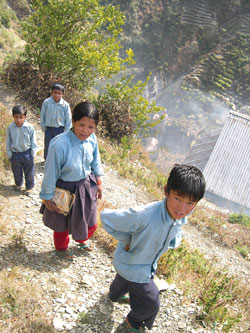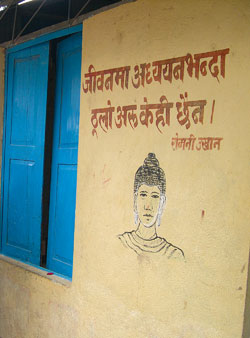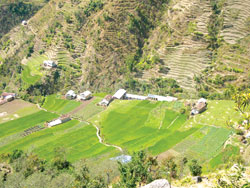|
|
During the conflict and even for some time after, Maoists used schools to demonstrate their weapons, other political parties used students to further their cause, and fights were constantly breaking out between students affiliated with different parties. For the first time in years students feel safe in classrooms.
In Chamringbesi, local party workers, government body, parents, teachers, and students have came to an agreement on the graffiti and much more. They agreed that no parties would be allowed to form sister organisations or conduct political activities in the school. Students are not allowed to participate in political activities from 10AM to 4PM, and the schools will not be used as polling centres in the upcoming elections. There are three primary schools, one lower secondary school, and secondary school in this village south-west of Dhulikhel.
 What's happening here has become a model for five other VDCs, and 39 schools in Kabhre have been declared zones of peace by Partnership Nepal. This remarkable effort comes at a time when mainstream parties are lobbying to allow government employees at all levels to be members of political parties.
What's happening here has become a model for five other VDCs, and 39 schools in Kabhre have been declared zones of peace by Partnership Nepal. This remarkable effort comes at a time when mainstream parties are lobbying to allow government employees at all levels to be members of political parties.
"Getting consensus was difficult at first," says Ram Prasad Dahal of the management committee of the school. "But eventually all parties signed a code of conduct, and we erased slogans off the wall in the presence of Maoist party cadres," he explains.
The case of Chamringbesi's schools will be worth following. Maoist cadres, who once made schools their staging posts, are whitewashing over their own grafitti. 'Jamin', Kabhre Area One member, says these are initiatives at the local level, and he and his comrades here have received no feedback yet from the Maoist central command. He also warns that "if other parties go against the agreement, we will not sit still."
 Meanwhile, Rupesh Pakhrin, former chairman of the NC-affiliated Nepal Student Union's school unit, says that he is unhappy with the decision to eliminate political organisations from schools though it is a "commendable" one. "Organisations that have been around for some time are not easily dissolved," he warns. "If students are not being treated properly or if teachers are involved in malpractices, we need unions to protest," argues Pakhrin.
Meanwhile, Rupesh Pakhrin, former chairman of the NC-affiliated Nepal Student Union's school unit, says that he is unhappy with the decision to eliminate political organisations from schools though it is a "commendable" one. "Organisations that have been around for some time are not easily dissolved," he warns. "If students are not being treated properly or if teachers are involved in malpractices, we need unions to protest," argues Pakhrin.
Most students and community activists desperately want this code of conduct to work out. It will be up to the parties to prove their good faith.
Model village
It's a two-hour drive to Dhungekharka from Banepa, and from there a three-hour walk to Chamringbesi. Part of the reason schools in this little hamlet are trying innovative ways to ensure their children get a decent education is due to the efforts of Partnership Nepal's campaign to make schools peaceful areas and UNICEF's Decentralised Action for Women and Children, says Goma Gole, chair of the village's paralegal committee. "Development shouldn't just be for the headquarters," she argues. Chamringbesi is the first of 27 villages in which DAWAC operates to have positively implemented all DACAW programs succesfully in a span of just one year, and will be awarded for its achievements by UNICEF this year.
The women in this region are slowly becoming aware of their rights, they are eager to learn new skills and are thinking about saving and investment via microfinance. "So much has changed for us here," says Tulasi Pakhrin "we may be a rural village but with awareness and skills we know we can be as modern as Banepa soon."
There are 10 youth and women clubs here, each that are actively involved in empowerment and awareness programs. Health and education are priorities in development plans for this VDC. DACAW has helped build toilets in every house, and the program's push for children to enrol in and attend school has been largely successful. These changes were hard-won, residents say, and they will do all they can to make sure they last.



